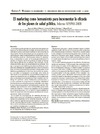Please use this identifier to cite or link to this item:
https://accedacris.ulpgc.es/jspui/handle/10553/43328
| Title: | Marketing as a tool to increase the effectiveness of public health plans. 2008 SESPAS Report | Other Titles: | El marketing como herramienta para incrementar la eficacia de los planes de salud pública. Informe SESPAS 2008 | Authors: | Beerli Palacio, María Asunción Martín Santana, Josefa Delia Porta, Miquel |
UNESCO Clasification: | 531105 Marketing (comercialización) | Keywords: | Marketing social Salud pública |
Issue Date: | 2008 | Publisher: | 0213-9111 | Journal: | Gaceta Sanitaria | Abstract: | Recent years have seen a steady increase in social marketing applied to health with the aim of increasing public awareness and changing people's behavior. Programs or actions based on the principles of social marketing have been shown to be effective in improving public health. However, that is not the general rule in Spain, where health policies have been based on health plans directed more to economic efficiency than to citizens' needs. For a health marketing program to be effective, the following factors are necessary: 1) the program has a long-term temporal horizon for action; 2) the objectives are established in terms of behavioral changes; 3) market research is used as a source of information; 4) different actions are established according to the segments identified as targets; 5) the program is operationalized in the four variables of the marketing mix, namely, product, price, distribution and communication, and is not only based on advertising campaigns; 6) the core of the program is exchange, understood as the factors that motivate people to change in return for the promise of something beneficial to them; 7) the factors or forces that compete with the desired behavioral changes are neutralized, and 8) businesses' social responsibility is used as a mechanism to reinforce health improvement programs. The design of health marketing programs should include definition of strategic and operational actions aimed not only at potential adopters of the desired behavior but also at all agents who may help or hinder behavioral change (health professionals, the pharmaceutical industry, politicians, the advertising industry, and products and services with health-challenging objectives). | URI: | https://accedacris.ulpgc.es/handle/10553/43328 | ISSN: | 0213-9111 | Source: | Gaceta Sanitaria[ISSN 0213-9111],v. 22, p. 27-36 |
| Appears in Collections: | Artículos |
SCOPUSTM
Citations
5
checked on Jun 8, 2025
Page view(s)
94
checked on Jan 4, 2025
Download(s)
245
checked on Jan 4, 2025
Google ScholarTM
Check
Share
Export metadata
Items in accedaCRIS are protected by copyright, with all rights reserved, unless otherwise indicated.
